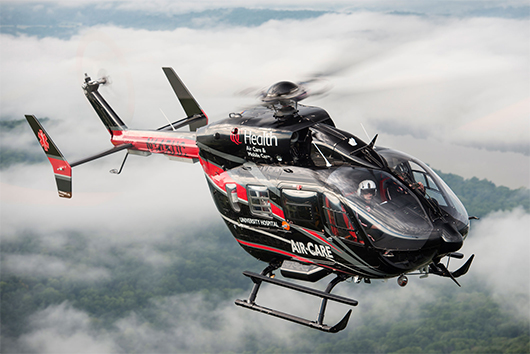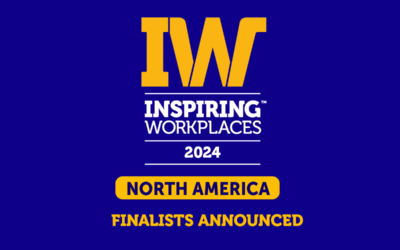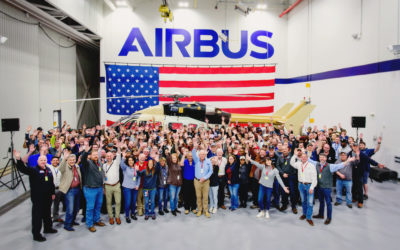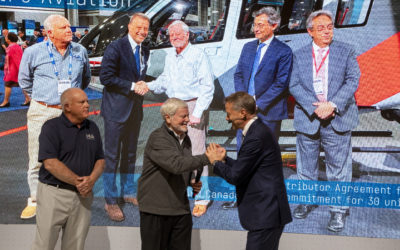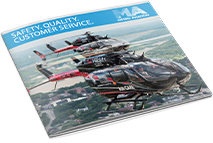March 14, 2022
A lawsuit brought by the Association of Air Medical Services (AAMS) over the implementation of the No Surprises Act has deeply divided the U.S. air medical industry, with some hospital-based providers claiming that AAMS has jeopardized their programs by prioritizing the interests of independent providers.
Metro Aviation — which operates 155 aircraft for 39 traditional air medical customers — withdrew from AAMS last month, telling the trade association that its “continued actions will very likely do great harm to the very hospital-based air medical providers that form a large part of your membership and that you purport to represent.”
“It was a very, very hard decision for Metro to make. We’ve supported AAMS for almost 35 years,” Metro co-owner and director of business integration Todd Stanberry told Vertical. Stanberry resigned from the AAMS board on the same day his company severed ties with the association, Feb. 11.
“At the end of the day . . . this wasn’t about Metro, this wasn’t even about just Metro’s customers, it was about what’s right for the industry,” he said. “And we saw just a philosophical, ethical problem with an industry trade organization that purports to represent the majority of that industry . . . basically siding with one segment of the industry.”
AAMS disputes this characterization, contending that the arguments in its lawsuit, “if successful, will benefit every member and the medical transport industry.”
“While it is unfortunate that some within the industry continue to misinterpret this position, AAMS is confident that our lawsuit and our broader public policy platform serve to enhance the viability, quality, and safety of every medical transport service,” the association said in an emailed statement.
Dissimilar business models
At issue is AAMS’s position that hospital-based and independent air ambulance services should be considered separately for purposes of calculating the qualifying payment amount (QPA), defined in the No Surprises Act as the median of the contracted rates that a health insurance plan or issuer pays for a service.
Congress passed the No Surprises Act in late 2020 to prohibit most healthcare providers — including air ambulance providers — from billing patients for services not fully covered by their insurers because the providers were out of network. The air ambulance industry had become notorious for such surprise “balance bills,” with the highest charges associated with independent providers such as Air Methods and Global Medical Response, which are owned by private equity firms.
A white paper published last year by Brookings estimated that private equity and publicly traded air ambulance carriers had a standardized average charge of $48,155 across 2016 and 2017, around 75 percent higher than other providers’ standardized average charges of $27,366. Because private-equity carriers were also more likely to be out-of-network, 55 percent of their helicopter transports in 2017 had the potential to result in a balance bill, compared with 29 percent of transports from hospital-based, nonprofit, and independently owned providers.
Some independent providers have used balance billing as a tool for extracting higher payments from insurers, as a patient who receives a surprise bill for tens of thousands of dollars is likely to pressure their health plan to cover more of it. Although various states have attempted to rein in air ambulance providers’ charges, courts have consistently ruled that they are preempted from doing so by the 1978 Airline Deregulation Act.
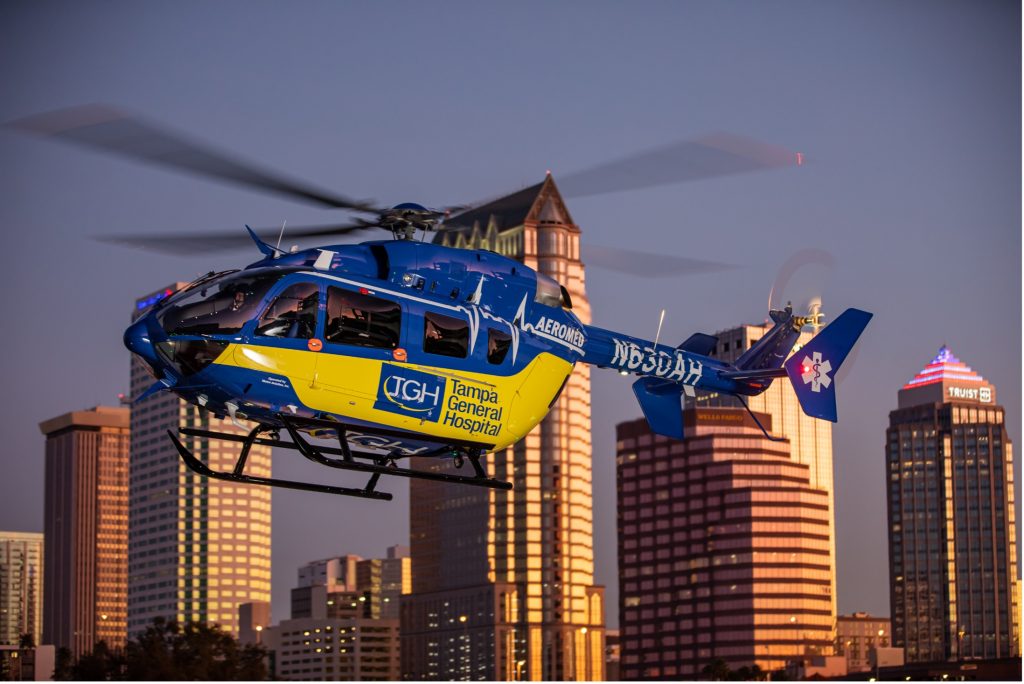
For Metro customer Tampa General Hospital (TGH) Aeromed, around two-thirds of its patient transports do not have TGH medical facilities as their destination, and therefore TGH doesn’t realize any additional hospital-based revenue from them. “This is an important fact, and why the business model of the air medical provider should not be included in the determination of the [QPA],” declared program director John Visokay.
The No Surprises Act removes patients from the middle of payment disputes, giving insurers and providers 30 days to negotiate a settlement between themselves. If they are unsuccessful, then the claim will go before an independent dispute resolution (IDR) entity, which will award either the provider’s or the insurer’s proposed payment amount in a so-called “baseball-style” arbitration.
According to the No Surprises Act, the IDR entity must consider the QPA for air ambulance services in the same geographic area, as well as factors including patient acuity, the provider’s quality and outcomes measures, the training and experience of its medical personnel, and the type of vehicle used. They may not consider the provider’s billed charges, which can greatly exceed the QPA, or the “non-negotiated rates” of government payers such as Medicare, which can be well below the cost of providing the service.
With an effective date of Jan. 1, 2022, the No Surprises Act gave government agencies barely a year to write the rules necessary for its execution. In July and September last year, the U.S. Departments of Health and Human Services, Labor and the Treasury, along with other agencies issued two interim final rules, Part I and Part II, spelling out how they planned to implement the legislation.
Among other things, Part I stipulates that all providers of air ambulance services are considered to be a single provider specialty for purposes of calculating the QPA. Part II dictates that the IDR entity must select the offer closest to the QPA unless other information clearly demonstrates that the QPA is not appropriate.
Most air ambulance companies were united in their opposition to Part II. Among them was Metro, which felt that the emphasis on the QPA gave short shrift to other factors, such as vehicle type and clinical capability, that would reward investments in safety and patient care.
“The reason [the No Surprises Act] had full support from the industry at the outset was because Congress actually listened to the industry when they were forming this law,” Todd Stanberry said. “It was because they didn’t just consider things like median in-network rates being the best way to determine reimbursement. . . . And so, for the agencies to come out and say, never mind what Congress said, just use the QPA — that’s not considering the whole ball of wax.”
Challenging Part II’s reliance on the QPA is a major part of the lawsuit that AAMS filed against the federal government in November 2021, and “that part of the lawsuit we agree with,” Stanberry said. So did a federal judge in Texas, who last month sided with the Texas Medical Association in a similar lawsuit that challenged the priority given to the QPA. (The government has 60 days to appeal the ruling.)
However, AAMS’s lawsuit also takes issue with Part I, contending that the government should distinguish between hospital-based and independent air ambulance providers for purposes of calculating the QPA. It is this aspect of the case that has driven a wedge between hospital-based and independent providers, with each side perceiving an existential threat to their business.
An unfair advantage?
According to AAMS, hospital-based and independent air ambulance providers should be treated separately under the No Surprises Act because of differences in how they negotiate with insurers.
“Entities that bill through a hospital system commonly enter into a network agreement with an insurer based on a much broader universe of hospital-based services that the hospital system offers,” the association’s lawsuit states. “As a result, air ambulance transport rates in hospital contracts are often far lower than the true cost of providing care in the area.”
AAMS points out that the No Surprises Act treats hospital-based and freestanding emergency departments separately and argues that it should do the same for air ambulance providers. If independent providers are forced to accept a QPA that includes lower rates for hospital-based providers, AAMS argues, then they could be driven out of the market.
However, Metro and many of its hospital-based customers believe that calculating separate QPAs for air ambulance providers based on business model would unfairly penalize hospital-based programs that fly more capable aircraft with more sophisticated clinical capabilities. The Association of Critical Care Transport (ACCT) has been a longtime champion of linking air ambulance reimbursements to quality and safety, and with Metro’s support filed an amicus brief in the AAMS case in late January.
“AAMS’s proposed distinction . . . would irrationally reward the adoption of a business model that has led to a broken air-ambulance market with skyrocketing prices and perverse incentives that reward profit-driven opportunism rather than patient care and flight safety,” the brief states. “It could also push even lower the rates for some of ACCT’s providers, jeopardizing their ability to operate fully and invest in better equipment and medical care.”
For example, in a supporting declaration included with the amicus brief, Dr. William Hinckley, air medical director for UC Health Air Care & Mobile Care, suggested that a lower contracted rate could force his program to reduce its coverage from three bases to two. Based at the University of Cincinnati Medical Center, Air Care flies twin-engine helicopters under instrument flight rules (IFR) with state-of-the-art medical equipment, including the ability to transport patients on extracorporeal membrane oxygenation (ECMO). There is a dual-certified flight nurse/paramedic and an emergency physician or acute care nurse practitioner on every flight.
By contrast, Hinckley said in his declaration, most of the independent providers in the Greater Cincinnati region fly single-engine aircraft, typically with a clinical team consisting of a flight nurse and paramedic. None of them can do planned IFR missions or fly patients on ECMO, and they also lack advanced medical equipment such as ultrasound and ICU-tier ventilators.
“The AAMS lawsuit would create a two-tiered system which would enrich programs that, despite significantly less clinical and aviation safety capability, would be paid more per transport than a program like UC Health Air Care,” Hinckley stated. He noted that when UC Health negotiates with payors, it does not provide a discount for air medical services in order to receive higher reimbursement for other services, contrary to AAMS’s argument.
AAMS rejects the assumption that calculating different QPAs for hospital-based and independent providers would necessarily reduce the reimbursement received by the former.
“We believe air ambulance providers should have the opportunity, regardless of business model, to seek whatever payment they deem appropriate based on whatever facts and circumstances they choose to present to the IDR entity, without restriction and without meeting a heightened evidentiary burden,” the association told Vertical.
“Further, similar to the distinction the rule made for hospital emergency rooms, the AAMS position on separate specialties only seeks to recognize the difference between those healthcare providers that are able to negotiate with insurers on a multitude of services and those that are not when calculating the QPA,” AAMS added. (The government agencies it is suing maintain that there are material differences in the case mix and level of patient acuity in the two types of emergency rooms that do not exist between different types of air ambulance providers.)
However, Metro doesn’t buy the claim that AAMS’s proposed distinction would not lead to higher reimbursement for independent providers at the expense of hospital-based ones — hence its decision to withdraw from the trade association that it feels no longer represents its interests.
“We understand that independent providers have an incentive to argue that they should be treated differently from hospital-based air medical providers. That is, of course, their right,” Metro wrote in a letter to AAMS in December. “But an industry organization like AAMS, which claims to represent the entire industry, should not be advocating that position when it runs contrary to the interests of a significant portion of its own membership.”
Stay Updated with Metro
Inspiring Workplace Finalist
North American Inspiring Workplaces Awards March 21, 2024 Source: Inspiring Workplaces The Inspiring Workplaces Group is delighted to announce today the 2024 Inspiring Workplaces Finalists across North America. This announcement brings these exceptional finalists one...
final EC145e delivery worldwide
Airbus Helicopters marks a milestone with the final EC145e delivery worldwide March 18, 2024 from Airbus Helicopters On March 18, Airbus Helicopters delivered the 43rd and final EC145e to Metro Aviation at Airbus Helicopters’ production facility in Columbus,...
METRO SIGNs DISTRIBUTOR AGREEMENT FOR THE AW09 HELICOPTER IN NORTH AMERICA
Metro signs distributor agreement for AW09 in North America February 29, 2024 US-based HEMS operator Metro Aviation has signed a distributor agreement for the AW09 next generation single engine helicopter. Metro will act as a Leonardo distributor for the type in the...

